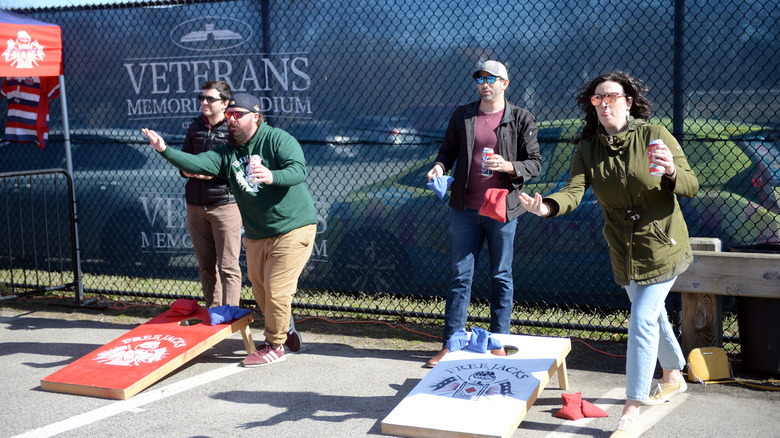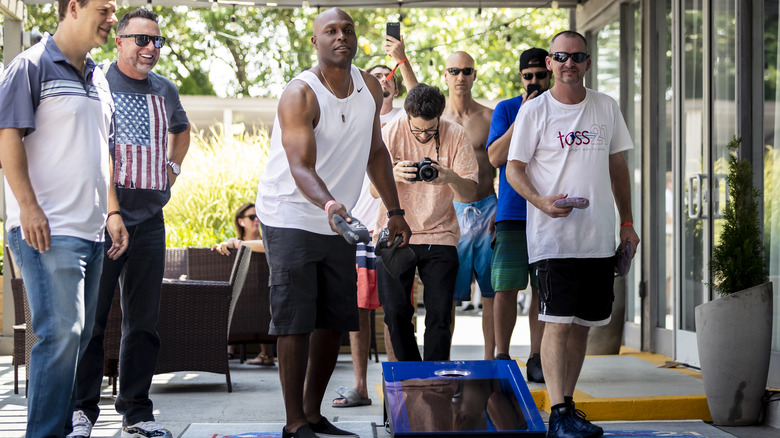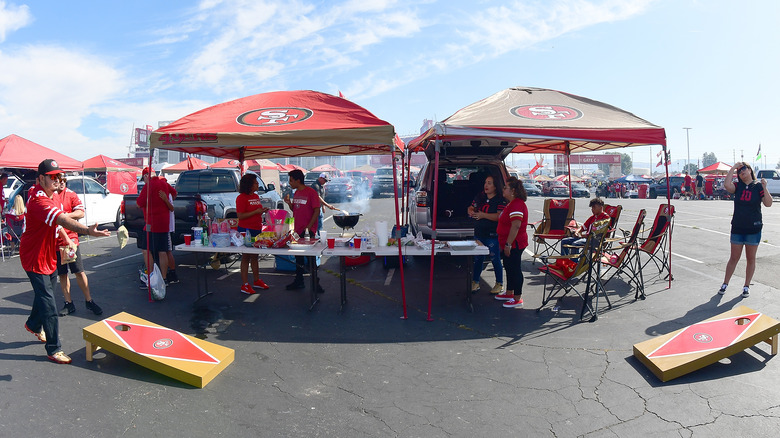What The Life Of A Professional Cornhole Player Is Really Like
You probably know the lawn game called cornhole, which is popular to play at bars, barbecues, and community events. But you might be surprised to learn that it is also a professional sport, with tons of leagues across the U.S., as Media Hub reports. The sport has gotten a huge boost during the recent Covid outbreak, because it can be safely played while distanced from other competitors. And brands have noticed — big names like Bush's Best, Bacardi, and Johnsonville have sponsored recent American Cornhole League (ACL) tournaments. At a time when cornhole has never been more popular, what is it like to be a professional cornhole player?
Versions of the cornhole game have been around since at least 1883, when Heyliger Adams de Windt patented a game called "Parlor Quoits" (via Google Patents). The game was played as a casual backyard activity for decades before it was made into a professional sport (via Cornhole Canvas). Around 2005, the American Cornhole Organization (ACO) was formed; the American Cornhole League (ACL) was then created in 2015. These are the two leading leagues that most professional cornhole players in America compete in today.
Anyone can play
For those who are really serious about this backyard sport, according to Cornhole Worldwide, anyone can become a professional cornhole player. Pay a $25 fee, and you can join the American Cornhole League. Then, you'll be placed with other players with the same experience. And if your team is good enough, you could even compete in the Championship of Bags (COBS) for a chance to win $50,000 and the admiration of your fellow cornhole players. The Washington Post reports that the league has 55,000 members and growing — and no wonder, when the top prize in 2020 was $250,000. That's a substantial gain from the $180,000 prize that players competed for in 2019. And for players who want to join the big leagues, the American Cornhole Organization (ACO) holds competitions that are actually televised on ESPN and ESPN2.
The Star reports that one cornhole star is 34-year-old Rudy Thomas from Milton, Delaware. He is the organizer of the "Usual Suspects" league, which has more than 50 players who gather each Tuesday. Thomas encourages people of all ages to play, from young children to elderly adults and everyone in between.
Official rules
Thomas got his start when he played against a few friends for a barbecue, per The Star. After his friends played an exceptionally good match, Thomas's competitive spirit made him want to improve his skills. He picked up some inexpensive cornhole boards to practice with, and soon found himself able to beat other people at the game. He has now been playing professionally for three years, and has competed against some of the best cornhole players since going pro.
These are the official cornhole rules, according to the American Cornhole Organization (ACO): each player has 15 seconds to throw each of their four beanbags. If the bag lands on the wooden board, that's called a "woody," and it's worth one point. If the player gets the bag in the hole, that is referred to as a "cornhole," and is worth three points. Players also have to stand inside a pitcher's box for the bag to count.
New players vs. experienced players
Any beanbag that breaks an ACO rule or doesn't land on the cornhole board is called a "dead bag" (via the American Cornhole Organization). The beanbag is also considered dead if it touches something else while in the air (like if it smacks the ceiling), or if the bag touches the ground while it's on the cornhole board. The Washington Post reports that most professional games go until a player gets 21 points. For televised events, the matches are played in 10 rounds, with the highest scoring player taking the prize.
Thomas says that each player has their own style, and suggests that newcomers play against experienced players to level up their skillset (via The Star). He has met lots of new people since going pro. Cornhole definitely encourages community building with events held at casual venues, such as a Paradise Grill location, and the Delaware Taco Festival. Thomas says that at the end of the day, cornhole is all about bringing folks together for a fun time.
The real life of a professional cornhole player
Another professional cornhole player is 30-year-old Ryan Smith of Herdon, Virginia (via The Washington Post). For his day job, Smith works as a project supervisor, and he enjoys playing professional cornhole in his free time. He reportedly made at least $10,000 playing the sport in American Cornhole League matches in 2019. Like Thomas, Smith also got into cornhole as a recreational pastime, playing for the first time at a Buffalo Wild Wings, but he wanted to push himself to improve his accuracy. He now plays both singles and doubles matches, and was ranked as the 13th best player in the league in 2019.
Media Hub reports that even young people can excel at cornhole — take 18-year-old Erick Davis for example. By age 12, he was competing in ACO tournaments, and even broke into the top ten during his first professional game. Just two years later, he took first place in the ACO's junior division competition.
The future of cornhole
In 2020, Erick Davis joined the ACL and played in televised matches. He says he sometimes gets recognized by cornhole fans who saw him on ESPN (per Media Hub). The prodigious player has even created at least two brand new types of cornhole moves — his signature move actually blocks his opponent from scoring. In the 2021 season, Davis placed 10th in the singles competition, and took third place in the doubles competition. And Davis revealed that he will make about $150,000 playing cornhole in the 2021-2022 season. He is very competitive, hopes to win a perfect-scoring cornhole match in a televised game on ESPN.
He doesn't practice much during the off-season. In his free time, the teenager also enjoys playing video games and golf.
As the sport continues to draw in new players, the American Cornhole League reports that this season, the top player can win $1 million.





